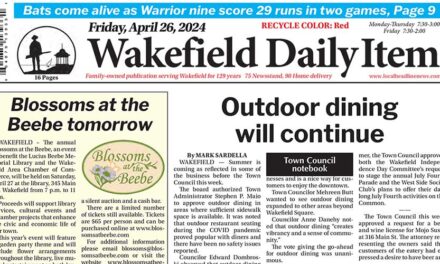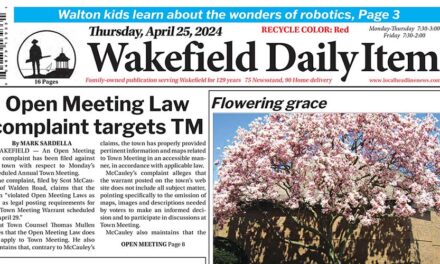Published in the August 24, 2016 edition
By GAIL LOWE
There’s a woman in Billerica who owns a Cape Cod home with a beautifully landscaped acre of land. So dedicated is she to keeping it in tiptop shape that she contacted a well digging company with the idea that if a well were installed it would reduce her water bill. The goal was to keep her grass green and flowers and shrubs generously watered all summer.
When the well digging company sent out a crew, they drilled in a half dozen areas on her land but could not find water.
This is most unfortunate because sometime in July, Billerica imposed a water ban. Since then, the woman can only water on Saturdays, and now her grass crackles like hay when walked on.
So far, a water ban has not been imposed in Wakefield but at least one sign has been posted advising residents to conserve water.
Fire Chief Michael Sullivan is grateful for Crystal Lake, he said, because it’s a back-up source of water. But what if this summer without rain extended into the fall, winter, next spring and beyond? What if the water level in Crystal Lake fell drastically?
Because of the Billerica woman and the out-of-control wildfires in California, I’ve been thinking about what it would be like to live in a world with a limited water supply. What would such a world look like?
Come along with me and I’ll take you on a little Orwellian ride.
For years, there has been talk about desalinating ocean water to shore up the water supply. But excessive costs and environmental concerns have stopped this idea in its tracks. Right now we have a vast supply of ocean water, thanks to the Atlantic, Pacific, Indian and Arctic oceans. But if desalination turns out to be the wave of the future, could ocean water be so expensive no one could afford it?
We all know that water is vital to life. In fact, the human body is about 60 percent water, give or take. Like air, we cannot survive without it. But what would happen if it were no longer available? What if only the richest among us could afford water? What would the world look like then?
Rich or not, ski resorts would shut down due to lack of snow. Kids would no longer be out skating on Lake Quannapowitt. Sliding down the slope at Bear Hill would become a long-forgotten memory. So would swimming pools. Companies that sell garden products would go out of business. Landscapers would close their doors, too. But paving companies would see a rise because people would opt for blacktop instead of grass in their yards.
Fire departments would no longer exist because there wouldn’t be enough water to put out fires. People would have to fend for themselves.
Citizens would fight for what water remains and black markets and criminal cartels running those markets would become superpowers. These cartels would be even worse than what we see today in Central and South America where drug-runners think nothing of killing anyone who gets in their way.
During a prolonged drought, as thirst worsened, so would hostility. Riots would happen daily. House breaks would increase. Police wouldn’t be able to keep up. Neighbors would rise up against neighbors suspected of being survivalists because surely water would be hoarded in their cellars.
Farmers would be among the first to demand and get water to grow crops. But the meager harvest would push prices through the roof. People would sneak into fields at night to drink what they could from molasses-colored puddles. Cows would no longer produce much milk because of the water shortage.
On Wall Street, commodities traders would fatten their wallets even more than they already do by selling water futures on the market. Oh, and they would not have to worry about where to get their own water because they’d have connections who’d tell them where to buy it for pennies on the dollar.
People would have to pay thousands of dollars every year to city and town Water Departments to pay for their limited supply. The once-a-week bath (or shower) would again be the norm and as water became even more scarce goose grease, an agent used to keep body odor in check during the time of King Henry VIII, would be sold at drug stores. Then, the FDA would approve a powerful new anti-perspirant people could buy but only if they had a prescription. Insurance companies would refuse to cover the expense because they would consider anti-perspirant frivolous.
In Africa, where water shortages are as common as the American penny, the continent would become a wasteland where nothing could live — not human and not animal. All those creatures people gawk at in zoos would be gone — lions, giraffes, monkeys, hippopotamus. Countries would be so overwhelmed with the dead their bodies would rot under the hot, blazing sun.
Water is used to cool reactors in nuclear power plants, so in places that have them—the U.S., Japan and France, for instance—these plants would have to be shut down because of the severe water shortage. And shutting down a nuclear power plant would likely set off a disaster that would release radiation into the air — enough to kill every living thing on the planet. Think about what happened during and after the Fukushima meltdown in March 2011. The scene was not pretty.
Most of us fortunate enough to have a surplus of money in checking accounts or savings in 401K plans and IRAs—all liquid assets—keep an eye on balances, hoping to see the money grow year over year.
But there’s that other liquid asset we all take for granted. Water.
Maybe before we rinse out that single glass, run the water while brushing our teeth, use the washing machine for only a few items or indulge in 20-minute showers, we should thank God that water has been available to us all our lives.
We should also pray this remains the case. Let’s hope that we don’t become like Native Americans who once danced for rain. Let’s pray that the summer of no rain is an anomaly and not a warning about what might be coming next if we don’t smarten up.





